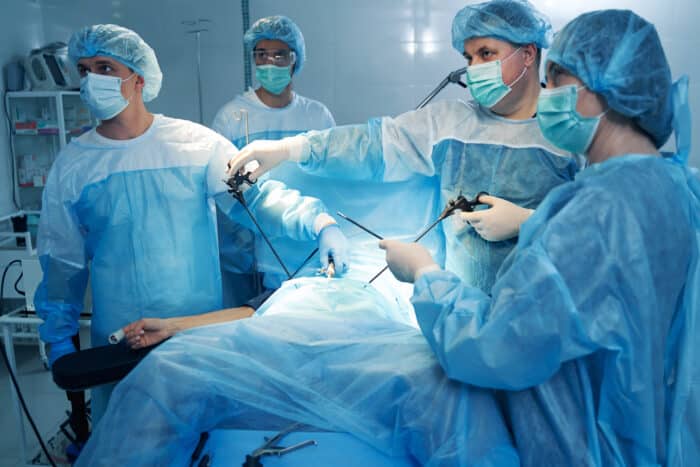As soon as you get certified you should look for employment opportunities and to do that you need a well-crafted resume.
It is believed that you should design your resume in a manner that attracts the attention of HR in just 6 seconds. If your resume fails to do so, the chances are very low for you to secure many interview opportunities.
So, to guide you through this, in this article we’ll be discussing what it takes to impress employers and set you apart from the rest, and how should you craft your resume to attract more interview offers.
Let’s start –
Surgical Tech Job Description
As soon as you land in a job portal to seek out employment opportunities you will come across a JD or job description for that role. This is for your help to understand what an employer wants from its employees.
The Job description contains several parts, let’s understand them –
The first is a Job Title, which indicates the name of the vacant position they aim to fill. In this case, it would be a Surgical Technologist.
Then there is the job summary. Here, they have written about the job, the role that they offer, their expectations, and the expertise level of the position. With time, you could judge by the job summary alone if the position fits you or not.
Lastly, there is a section dealing with the education, certifications, skills, responsibilities, benefits, and other requirements details which would give you a proper idea if you should apply for the position or not.
Read -> What is a Surgical Tech?
How to write a Surgical Technician Resume? With Examples
Now, if you find yourself fulfilling all the requisites and are happy with the benefits, you can apply for the position. But wait, you don’t have a resume yet. How would you apply without it?
So, first, let’s understand how can you craft your resume.
We are only providing a general framework as you should personalize your resume; and highlight the aspects that make you unique as an individual and a qualified Surgical Tech.
Contact Information
In this section, you need to include your full name, professional email, phone number, LinkedIn profile, or other social profiles. This section starts the resume and is generally placed on the left side.
For Example
[Your Name]
[Address]
[City, State, ZIP Code]
[Phone Number]
[Email Address]
Resume Objective/Summary
This is your introductory line to the employers. This has a huge potential to make or break the deal. So, you need to write a powerful statement highlighting yourself, your career goals, relevant skills, and experience as a Surgical Tech.
Example – Dedicated Certified Surgical Technologist with [number of years] years of experience in various surgical specialties. Seeking a challenging position in a dynamic healthcare facility where my expertise in surgical procedures, sterile techniques, and patient care can contribute to the success of the surgical team and enhance patient outcomes.
Read More:
-> Online Surgical Tech Programs
-> Surgical Tech Classes & Courses
-> Surgical Tech Program & Training
Key Skills
There are debates on whether the Experience section or Skills section should come first. But the employers are often looking for candidates with strong skill sets.
So, employers actually value the Skills section more and thus we put it above. Go ahead, and put all the relevant skills, including the soft skills.
More On -> What Does a Surgical Tech Do?
Here are the Skills that your resume must have –
- Proficient in aseptic techniques and maintaining sterile fields
- Extensive knowledge of surgical instruments and equipment
- Strong communication and teamwork skills
- Ability to adapt to fast-paced and high-stress surgical environments
- Detail-oriented with excellent organizational skills
- Familiarity with electronic health records (EHR) and surgical software
- CPR and Basic Life Support (BLS) certified
Soft Skills
- Communication skills
- Professionalism
- Attention to detail
- Problem Solving, Reasoning, and other relevant skills.
Work Experience
As we gave weightage to skills doesn’t mean your experience doesn’t count. You need to detail your professional experience including a brief description of your responsibilities and accomplishments.
Freshers? Worry not! You could include your externships, internships, and anything that you have worked on. Just focus on your skills and education section.
Clinical / Work Experience Example
[Hospital/Clinic Name], [City, State]
Certified Surgical Technologist
[Start Date] – [End Date]
Descriptions
- Assisted in over [number] surgical procedures, demonstrating efficiency and attention to detail.
- Facilitated communication among surgical team members to enhance workflow and patient care.
- Contributed to the training of new surgical technologists, sharing knowledge and best practices.
- Participated in the maintenance and organization of surgical instruments and supplies.
- Collaborated with the Materials Management team to ensure timely availability of surgical equipment.
Education and Certifications
In this section, you need to mention your educational background, including your degree, diploma, or certificate in Surgical Technology. Also, list any certifications you have obtained, such as the NCST certification by AHA.
Also Read:
-> How to Become a Surgical Tech?
For Example –
Education
Associate of Science in Surgical Technology
[Name of College or University]
[City, State]
[Graduation Date]
Certifications
Certified Surgical Technologist (CST) – NBSTSA or NCST
[Certification Number]
[Expiration Date]
Achievements and Awards
Highlight any notable achievements or awards you have received, such as recognition for outstanding performance, patient care, or participation in healthcare competitions.
For Example –
Professional Memberships:
Association of Surgical Technologists (AST)
Member since [Year]
Also Read:
Tailor the Content
Customize your resume for each job application by focusing on the skills and experiences that align with the specific job requirements of the Surgical Tech role you are applying for.
Surgical Tech Resume Sample
This is a sample resume for your reference alone. You could use your creativity and further polish it as per your needs.
A typical Surgical Tech resume would be like this –
Contact Details:
[Your Name]
[Address]
[City, State, ZIP Code]
[Phone Number]
[Email Address]
Objective:
Dedicated Certified Surgical Technologist with [number of years] years of experience in various surgical specialties. Seeking a challenging position in a dynamic healthcare facility where my expertise in surgical procedures, sterile techniques, and patient care can contribute to the success of the surgical team and enhance patient outcomes.
Education:
Associate of Science / Certificate in Surgical Technology
[Name of College or University]
[City, State]
[Graduation Date]
Certifications:
Certified Surgical Technologist (CST)
National Board of Surgical Technology and Surgical Assisting (NBSTSA)
[Certification Number]
[Expiration Date]
Clinical Experience:
[Hospital/Clinic Name], [City, State]
Surgical Technologist Intern
[Start Date] – [End Date]
- Assisted surgical teams in various procedures, including orthopedic, cardiovascular, and general surgeries.
- Prepared and organized surgical instruments, equipment, and supplies for each procedure.
- Maintained a sterile field throughout surgeries, adhering to infection control protocols.
- Collaborated closely with surgeons, nurses, and anesthesia providers to ensure seamless operations.
- Acted as a liaison between the surgical team and patients, ensuring their comfort and safety.
Work Experience:
[Hospital/Clinic Name], [City, State]
Certified Surgical Technologist
[Start Date] – [End Date]
- Assisted in over [number] surgical procedures, demonstrating efficiency and attention to detail.
- Facilitated communication among surgical team members to enhance workflow and patient care.
- Contributed to the training of new surgical technologists, sharing knowledge and best practices.
- Participated in the maintenance and organization of surgical instruments and supplies.
- Collaborated with the Materials Management team to ensure timely availability of surgical equipment.
You May Also Like:
-> Can You Be a Surgical Tech Without Certification?
-> Sterile Processing Technician vs Surgical Technologist
Skills:
- Proficient in aseptic techniques and maintaining sterile fields
- Extensive knowledge of surgical instruments and equipment
- Strong communication and teamwork skills
- Ability to adapt to fast-paced and high-stress surgical environments
- Detail-oriented with excellent organizational skills
- Familiarity with electronic health records (EHR) and surgical software
- CPR and Basic Life Support (BLS) certified
Professional Memberships:
Association of Surgical Technologists (AST)
Member since [Year]
Read:
-> Is Surgical Tech School Hard?
A few Tips to Apply on your Resume and while Applying for a Position
Now you know what to write in your resume, but to know how to craft it, you need to understand a few things first. Let’s discuss them –
Design of Your Resume
Your resume should be visually appealing while containing all the necessary information. If your resume is disorganized or cluttered, they are more likely to ignore it, so consider the layout as well.
Use clear fonts and cool colors. Also, try to limit your resume to one page, but if it doesn’t fit on a page, it is no crime to send a 2-page resume.
Lastly, there are plenty of free online resume templates, go check them out. But make sure the templates fit your profession.
Always Add a Cover Letter
The cover letters are not mandatory but it is an opportunity to mention some details and take it as an introduction to the employer. It can work wonders if it is individually tailored for the position you’re applying for.
Here’s an example –
Dear HR Team,
I have applied for the enlisted position of Surgical Tech at your organization. I am a graduate of Auburn University and is NCST certified through AHA.
I am looking for an opportunity to prove my skills and thus grow and evolve along with the organization. I am a team player, and detail-oriented, and have undergone my externships at [Name].
I believe I would be a good fit for this position and will be honored to be a part of your team.
I have attached my resume and filled out all the required details. I also have annexed my NCST certification and university certificates. I hope to discuss more with you soon.
Sincerely,
(Your name)
(Your phone number)
You May Also Like:
-> Surgical Tech Certification
-> How to Become a Certified Surgical Tech?
Besides these – Here are some Quick Tips
- Use a professional email address.
- Consider using a professional format. Consider using bullet points, headings, and consistent formatting to enhance readability.
- Keep it concise. The average length of a resume is 369 words. Make sure to not exceed 400 words.
- Highlight only the most relevant information. Hiring managers spend only 6-7 seconds on average reviewing a resume.
- Optimize for ATS by adding relevant industry-specific keywords. 75% of companies and 98% of Fortune 500 companies use Applicant Tracking Software (ATS) to screen resumes.
More On -> EKG Technician Resume
Related:
-> Is Surgical Tech School Hard?
-> Scrub Nurse vs Surgical Tech
-> Surgical Tech vs Surgical Assistant
Related Articles
-
How to Be Successful in College in 2022 – 7 Simple Tips to Succeed
-
How Do Scholarships Work? Read This First…Truth is Shocking
-
7 Best College Majors 2024: What Should I Major In?
-
How to Choose a College – 10 Things You Must Consider in 2024
-
Why Go to College? Top 13 Benefits for Adult Students in 2022
-
Top 5 Best Alternatives to Community College for 2024








